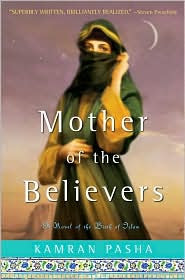 Synopsis
SynopsisDeep in the heart of seventh-century Arabia, a new prophet named Muhammad has arisen. As his message of enlightenment sweeps through Arabia and unifies the warring tribes, his young wife Aisha recounts Muhammad's astonishing transformation from prophet to warrior to statesman. But just after the moment of her husband's greatest triumph -- the conquest of the holy city of Mecca -- Muhammad falls ill and dies in Aisha's arms. A young widow, Aisha finds herself at the center of the new Muslim empire and becomes by turns a teacher, political leader, and warrior.
Written in beautiful prose and meticulously researched, Mother of the Believer is the story of an extraordinary woman who was destined to help usher Islam into the world.
My Thoughts
I should have delved into this book sooner, as it is quite well-written and full of adventure and conflict, but I was intimidated by the size of the book and feared it may be too "heavy" for a summer read. My fears turned out to be groundless.
However let me preface this "review" of my thoughts by stating that there were times when I had personal religious "issues" with this book, but had to tell myself to put all of that aside and simply read this as just a good story. So that's what I tried to do.
The story is told by the central character Aisha, who is known as the "Mother of the Believers", as she was the wife of the prophet Muhammad, the founder of the Muslim religion.
Aisha is an intelligent and strong-willed young child when we are introduced to her. Her father is one of the first followers of Muhammad, The Messenger of God who brought the Muslim religion to the world. The Messenger has a vision that reveals to him that Aisha is to be his wife. By their cultural "rules", Aisha cannot be married to him until she begins her cycles, which is at the tender age of nine.
When I read of young Aisha being married off at the age of nine to The Messenger (who I think was around 51 years of age), I began to suspect that the author of this book was a man (as I had not looked up info on the author yet at that point). All it took was reading of Aisha's wedding night, as the 9-year-old remembers:
I let myself go and fell into his embrace, losing myself in the wondrous sensuality of his body pressed against mine.Sorry. Surely only a man could dream up that a little 9-year-old girl could desire sex with a man-- that she would want it, enjoy it, and that there would be no pain. I'm sure that this was probably done to drive home the mystical connection that is believed to have existed between Aisha and Muhammad, but it just rubbed me the wrong way.
There was no fear. There was no pain.
There was only light.
The story goes on to follow the early years of the Muslim religion-- the battles that occurred, both on the field and in the private lives of The Messenger and his family and followers.
Moments of this book were very difficult to read. There were moments of incredible brutality, and most disturbing is knowing that this is not fantastical brutality, but that these are the types of things that do commonly occur in some other countries, especially areas like Saudi Arabia and Iran.
Aisha's character is strong, courageous and full of life. As just a child, her older half-sister Asma chose the new religion over her own mother.
Aisha and Asma's father, Abu Bakr, is one of the first followers of Islam. He is an honorable man and a loving father who expects a lot of his children.
One issue with the book (which probably really can't be helped, as I think that it is simply being authentic) is trying to keep people straight. Within just a few paragraphs, I had to deal with Abu Sufyan, Abu Talib, Abu Jahl and Abu Bakr. I sometimes had to read it over a few times in order to sort how who was doing what. Throughout the story, I eventually gave up understanding who people were. They could speak of Zubayr as if I should know who he was, but he was blurred together in my mind amidst the other 30 or so prime characters in the story. Some of this may be my own fault, as I took so long to read this story. I would put it down and come back and read 10 pages, and put it down. It wasn't until the final 200 pages that I really committed to sticking with this book and reading it through. So many characters in this book to keep track of!
The Messenger, Muhammad, is a strange mixture. Generally just and peaceable, he can exhibit great cruelty and heartlessness in the name of God.
I know that I prefaced this by saying that I tried to put my own religious views aside and view this simply as a good story. However I have to say that the things that I couldn't get past were the contradictions. You have men professing their faith in God, and using violence and murder to push their agenda. Not simply in defense of themselves, but in offense to gain ground with their religion and to garner more power. This bothered me.
I don't know how much of this story is based on fact and actual truth of who Muhammad was, but I have to take definite issue with a "man of God" issuing people's hands cut off for thievery and declaring war on Jews because they retaliated when one of his followers killed a Jew for a mere "prank". Definitely not the acts of a man of God.
You also had men "preaching" piousness, and at the same time taking young girls as slaves and raping them as war trophies, and keeping mistresses and such. None of this did much in gaining my sympathy. I always viewed the Muslim religion as a peaceful and pacifist and most assuredly pious religion (excluding the extremists who use terror for their own benefit), but this book has actually changed that. Now I'm not sure how I feel about it or what the true nature of the Muslim religion is. However, when it all boils down, it comes to this very basic fact: We're all human. And the author Kamran Pasha does a good job at portraying these characters as very human, just as flawed and vulnerable as the rest of us. Even The Messenger was really just a man.
The book also tells a story of what inspired the "law" that required women to be sheltered behind a veil-- one dealing with a wife of the Messenger of God flirting mercilessly with other men after she allows her jealousies get the best of her. There is a passage that says:
From now on, my life was to become a prison, even when I was not confined to the tiny apartment whose mud walls seemed to be closing in on me. For whenever I ventured out into the sun, my face would be hidden away behind a veil. The bars of my jail would follow me everywhere and were unbreakable, forged from a tiny strip of cotton that was stronger than the mightiest Byzantine steel.This passage really drove it all home to me-- what it's like to be a woman of this culture. Previously when I saw the elaborate hijab that women are required to wear in many middle eastern areas, I would mainly think of the physical discomfort of doing so: the weight of it, the heat in a stifling climate, the claustrophobia of having cloth sitting on my face all of the time, etc. I don't think that I fully appreciated the psychological/emotional discomfort. How stifling, to never be able to walk down a street and feel the sun on my face. To always feel the weight of the fabric would feel like a straight-jacket to me. It would be psychologically crippling for me. I just don't know how the women do it.
All in all, this was a good book. It was very well-written-- I can't fault the author in that. Most of my issues with the book are personal religious issues or moral issues. The book itself is well thought out and put together, with an exciting storyline that just keeps going and going. Very nice!
My thanks to A Bookish Mom for passing this book onto me for review when she found some parts of it too much to stomach to continue on with it.
About the Author
Kamran Pasha is a writer and producer for NBC's highly anticipated new television series Kings, which is a modern day retelling of the Biblical tale of King David. Previously he served as a writer on NBC's remake of Bionic Woman, and on Showtime Network's Golden Globe nominated series Sleeper Cell, about a Muslim FBI agent who infiltrates a terrorist group.
Kamran will soon be a published novelist as well. He has secured a two-book deal with Simon & Schuster's Atria Books to publish Mother of the Believers, an historical fiction tale showing the rise of Islam from the eyes of Prophet Muhammad's teenage wife Aisha, and Shadow of the Swords, a love story set amidst the Crusades.
And Kamran has also made strides in the video game world. He recently wrote Blood on the Sand for Vivendi Universal, the sequel to hip-hop mogul 50 Cent's bestselling game Bulletproof.
An expert on the Middle East, Kamran is one of the few successful Muslim screenwriters in Hollywood. In 2003, he set up his first feature script at Warner Brothers, an historical epic on the love story behind the building of the Taj Mahal. He is currently writing an epic film entitled The Voyage Of Ibn Battuta, which follows the adventures of a famous Arab traveler who journeyed to China in the 14th century. This feature is being financed by the Moroccan government and produced by French production company Forecast Pictures.
Kamran holds a JD from Cornell Law School, an MBA from Dartmouth and an MFA from UCLA Film School. He spent three years as a journalist in New York City, writing for media companies such as Knight-Ridder. During his time as a reporter, Kamran interviewed prominent international figures such as Israeli Prime Minister Shimon Peres, Peruvian President Alberto Fujimori, and Pakistani Prime Minister Benazir Bhutto.
Learn more about the author and this book on his website.UPDATE 11/19/09: Please go here to read the author's response to my review.
Product Details
- Pub. Date: April 2009
- Publisher: Simon & Schuster Adult Publishing Group
- Format: Paperback, 560pp
- ISBN-13: 9781416579915
- ISBN: 1416579915



















4 comments:
Great review! Thanks for your candor.
this looks really good. I love books like this and you give it a wonderful review.
Wow...there's alot here to deal with. I know reading about religion, especially one that isn't your own, can be uncomfortable.
I do feel that doing so can ultimately strengthen one's own faith in the process. I also really enjoy learning about other religions and trying to put myself into other mindsets. Great job with this review!
Great review! Glad that you enjoyed it.
I read it back in April or May and while I thought it gave a lot of wonderful information and context it just didn't work for me as a fiction story and I didn't think that it concentrated enough on Aisha.
Post a Comment